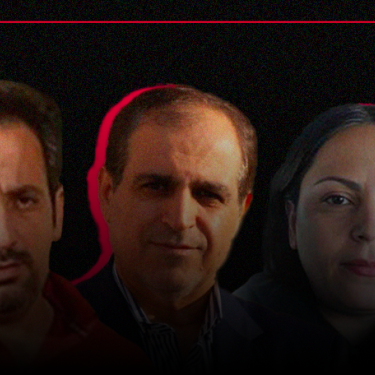Iran's ‘criminal’ journalists: a predatory judiciary casts a shadow over supposed pre-election reconciliation

Despite the Iranian government's attempts to show an attitude of reconciliation with the press in the run-up to the 1 March legislative elections, a sinister reality remains, with 15 journalists in prison ahead of election day and many others still actively pursued by a predatory judiciary. Reporters Without Borders (RSF) denounces the intensifying crackdown on press freedom, exemplified by tightening restrictions on journalistic work through judicial persecution and the broader ‘criminalisation’ of journalism.
The recent release of two journalists from prison, as well as the revival of the previously suspended Tehran Press Exhibition, an annual press exhibition showcasing media outlet’s engagement with the public, have come at a heightened moment. Beneath the surface of this supposed rapprochement towards the press, lurks a judiciary determined to imprison journalists. The judiciary's characterisation of journalists as "criminals", imprisonment despite the granting of an amnesty, and sentence extensions have all been attacks that underscore the judicial system's continued determination to treat journalists as enemies of the state.
“The continual assault on journalism knows no boundaries in Iran. In an effort to reconcile with the media landscape and fabricate a facade of acknowledgement and appreciation of Iranian journalism, the regime has tried to better its image by freeing two well-renowned journalists, Niloofar Hamedi and Elaheh Mohammadi and reinstalling the Tehran Press Expo. However, by detaining dozens of other journalists and actively persecuting them through judicial means, the Iranian authorities have failed to convince anyone of true efforts towards reconciliation.
In a stark illustration of the government's crackdown, Iranian journalist Ruhollah Nakhaei has commenced a two-year prison term despite receiving an amnesty reportedly ordered by Ayatollah Ali Khamenei in February 2023. Nakhaei’s ordeal began amid the 2022 nationwide Woman, Life, Freedom protest movement following the killing of Mahsa Amini. He was arrested in September 2022 while reporting on one of the protests and was subsequently released on bail. His case eventually received a harsh sentence of two years and seven months following proceedings in Branch 28 of the Tehran Revolutionary Court on charges related to "assembly and collusion against national security" and "propaganda against the Islamic Republic," even though an executive pardon had been due for many journalists arrested in the aftermath of these protests. Despite his appeal in 2023, the verdict was upheld on 20 February, compelling Nakhaei to serve the maximum term of two years' imprisonment.
In a similar light, Mehdi Rahmanian, Chief Editor of Shargh Newspaper, has been branded a ‘criminal’ by the Press Court, a first of its kind, for having published an article on the decreasing popularity of the hijab in Iran, even before a verdict had been released. Rahmanian faced accusations of disseminating falsehoods and publishing contrary materials, with his case eventually leading to a pardon on 27 February.
Against the backdrop of this pervasive climate of censorship, Nasrin Hassani, the editor-in-chief of the weekly "Siyahat-e Shargh" who is currently serving a seven-month sentence in Bojnourd prison, has received confirmation of a new one-year prison sentence on charges including “the dissemination of falsehoods” and “failure to observe Islamic hijab.” Even Iranian journalists abroad are not spared the iron fist of the regime’s predatory judiciary. According to leaked documents, more than 10 BBC Persian journalists, along with journalists from Iran International, Radio Farda, Manoto TV, and Voice of America, have been sentenced in absentia without being informed of the court proceedings, on charges of propaganda against the Iranian regime.
Iran is ranked 177th out of 180 countries on RSF’s 2023 World Press Freedom Index, with 87 journalists detained in connection with the Women, Life, Freedom protest movement from 2022 to 2023, and 15 still remaining behind bars.
